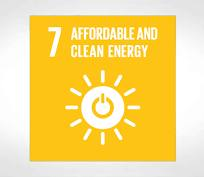AFFORDABLE AND CLEAN ENERGY
AIM:-
Ensure access to affordable, reliable, sustainable and modern energy for all
Goal 7 is about ensuring access to clean and affordable energy, which is key to the development of agriculture, business, communications, education, healthcare and transportation.
The world continues to advance towards sustainable energy targets – but not fast enough. At the current pace, about 660 million people will still lack access to electricity and close to 2 billion people will still rely on polluting fuels and technologies for cooking by 2030.
Our everyday life depends on reliable and affordable energy. And yet the consumption of energy is the dominant contributor to climate change, accounting for around 60 percent of total global greenhouse gas emissions.
From 2015 to 2021, the proportion of the global population with access to electricity has increased from 87 per cent to 91 per cent.
Ensuring universal access to affordable electricity by 2030 means investing in clean energy sources such as solar, wind and thermal. Expanding infrastructure and upgrading technology to provide clean energy in all developing countries is a crucial goal that can both encourage growth and help the environment.
Why to care about this goal?
A well-established energy system supports all sectors: from businesses, medicine and education to agriculture, infrastructure, communications and high technology.
Access to electricity in poorer countries has begun to accelerate, energy efficiency continues to improve, and renewable energy is making impressive gains. Nevertheless, more focused attention is needed to improve access to clean and safe cooking fuels and technologies for 2.3 billion people.
For many decades, fossil fuels such as coal, oil or gas have been major sources of electricity production, but burning carbon fuels produces large amounts of greenhouse gases which cause climate change and have harmful impacts on people’s well-being and the environment. This affects everyone, not just a few. Moreover, global electricity use is rising rapidly. In a nutshell, without a stable electricity supply, countries will not be able to power their economies.
Without electricity, women and girls have to spend hours fetching water, clinics cannot store vaccines for children, many schoolchildren can not do homework at night, and people cannot run competitive businesses. Slow progress towards clean cooking solutions is of grave global concern, affecting both human health and the environment, and if we don’t meet our goal by 2030, nearly a third of the world’s population – mostly women and children – will continue tobe exposed to harmful household air pollution.
To ensure access to energy for all by 2030, we must accelerate electrification, increase investments in renewable energy, improve energy efficiency and develop enabling policies and regulatory frameworks.

